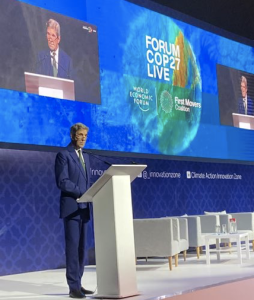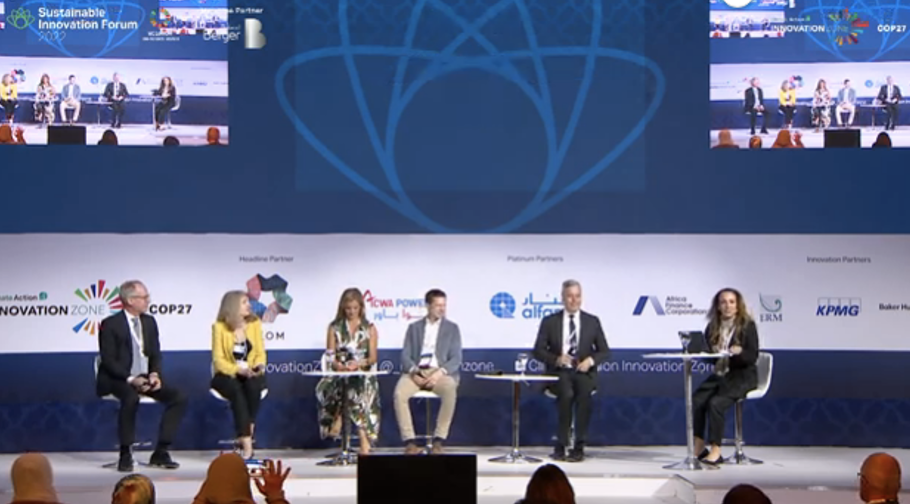
Disability Pride Month: Removing Barriers and Amplifying Voices
learn more
Hundreds of nations are gathered at COP27, the World Leaders Summit in Sharm El Sheikh, Egypt, held November 8-16 to address the planet’s most pressing crisis—climate change—with progress, not just pledges.

The venue itself was a metaphor. Beautiful, colorfully constructed spaces for social media photos were dotted around a man-made pool in the drought-stricken resort city on the Red Sea. A tunnel entrance adorned with potted flowers welcomed guests, but the leaves were dry and brown—the flowers had died without water. Was this a purposeful metaphor or just an unfortunate, small symbolic reminder of why we were there and the work still ahead of us?

“This is a moment for a global epiphany. It is not time for moral cowardice and reckless indifference to the future of humanity,” said Al Gore, former US Vice President and the founder of The Climate Reality Project, during his speech at the opening of the COP27 .

Gore’s message of “urgent action” has emerged as a central theme at this year’s COP, because the world is failing to meet its climate pledges to reduce greenhouse gas emissions, build resilience, adapt to climate impacts, and finance climate investments in developing nations, according to a report by the United Nations Framework Convention on Climate Change (UNFCC), and supported in other reports by watchdog nonprofits.
The UN noted there is “no credible pathway” to the Paris Agreement goal of holding global warming to 1.5 degrees Celsius without a radical increase in ambition from the international community.
Conversations from the Innovation Zone
During the first week of COP27, about 4,700 people (not including virtual attendees) attended the Innovation Zone, a physical hub for private and public sector leaders, designed to connect the climate community and to elicit critical discussions, to develop innovative solutions for net zero and a just transition. There were over 85 events held in the Innovation Zone the first week alone.
John Kerry Calls On the Private Sector

Wednesday, November 9: US Special Presidential Envoy for Climate John Kerry called on the private sector to lead decarbonization efforts in order to limit the earth’s rising temperature. “If we’re going to keep 1.5 degrees alive — and that is our goal — we have an enormous challenge ahead of us to bring to scale new technologies, and to harness the deeply capable capacity of the private sector and entrepreneurs, to bring them to the table.”
Thursday, November 10: In the Innovation Zone, Amyris Chief Engagement & Sustainability Officer Beth Bannerman (pictured far right) moderated a panel discussion with market leaders who, like Amyris, are disrupting the status quo in their own ways and paving a new path for thinking differently about how the private sector can democratize sustainability and establish a systems approach to set their sights beyond Net Zero toward climate positive consumption.

Panelists included (L-R) Carsten Lützenkirchen, Senior Vice President, Customer Solutions & Innovation, DPDHL Group; Jenny Davis-Peccoud, Chief Sustainability Officer, Bain & Company; Clare Woodford, Global Director, Impact and Marketing, Alpine Group; Johannes Demuth, Manager of Sustainability Policy at BMW Group; and Douglas Sabo, Global Chief Sustainability Officer at Visa.
Panel Highlights
Beth Bannerman, Amyris Chief Engagement & Sustainability Officer
“Amyris is redefining the way to make chemical ingredients. We stand for a novel technology that is better for the planet. Most people don’t give much thought to the production processes behind the ingredients that go into all the products we use every day, from what we put on our bodies, like shampoo and skincare or even what we take into our bodies like the sweetener in our coffee or more importantly, vaccines,” said Bannerman.
“The reason it matters is because nearly 60% of the global inputs into our everyday products are made from petroleum-based chemistry. And, by the way, it‘s not great news for natural products either — harvesting those natural resources causes a number of environmental issues from deforestation to the destruction of wildlife habitats, including marine life in the ocean. Manufacturing methods haven’t really changed all that much in at least a century and when you combine that with the earth’s rising temperature, the pressure on our natural resources has never been greater. The conditions are right for real change. And because we don’t see human consumption behaviors slowing down, the work that Amyris is doing to redefine the way chemical ingredients are made is not only essential, it’s exciting. We want to shift the world to sustainable consumption.”
Sharing Examples for “Urgent Action”
And it’s not only Amyris, of course, who is changing the game within the private sector. For the last decade or so, innovative companies from diverse industries across the private sector have pushed the boundaries in a variety of ways from sourcing raw materials, creating new markets and business models, and exploring ways to create more climate value in supply chains.
The World Economic Forum has estimated that Climate Adaptation will be a $2 trillion market by 2026, that the private sector cannot ignore, with first movers gaining a distinct competitive advantage.
Responding to the conference’s call for Urgent Action, each of the panelists shared more insights and examples of initiatives their companies have launched, in the hope that attendees, both in person and virtual would be inspired to rethink their own product development, design, supply chain and alliances.
Jenny Davis-Peccoud, Chief Sustainability Officer, Bain & Company
From Bain & Company, Davis-Peccoud shared insightful analysis showing that climate positive consumption is possible as more companies demonstrate a new way of thinking about product development, design and pricing to help consumers to make better decisions.
“If Starbucks can get the Chinese to drink coffee and Unilever can get us to switch from soap to shower gel, I think we can fully appreciate the power of consumer goods companies to shape what it is we do and buy. If we can turn that power to sustainable consumption, I’m convinced that [the challenge of scaling climate positive consumption] is possible.”
She continued, “It’s not going to be reliant on consumers passionately caring about sustainability. We’ve done the studies and about ten percent of consumers passionately care enough to make decisions fundamentally differently because of sustainability. There are a lot more that do care but they’re making a set of tradeoffs or balances for functionality, convenience, and other things… so we can’t rely on just those premium offers targeted to that ten percent because we need to transform the whole economy, not ten percent of the economy. We need to find ways to democratize sustainability which means to bring sustainability offerings onto shelves that consumers will reach for not because they are sustainable but because they are fantastic products and they happen to be sustainable.”
Douglas Sabo, Global Chief Sustainability Officer, Visa
Visa’s Sabo shared that partnerships and consumer awareness are key to powering climate positive consumption. He pointed to Visa’s participation in the 2022 Healthy & Sustainable Living research study by Globescan. “With the urgency of climate action continuing to grow, now is the time to redouble efforts to empower millions of consumers to adopt more sustainable behaviors and make more sustainable choices. Doing so starts with Visa and other partners helping the ecosystem of commerce better understand consumers’ sustainable living ambitions and aspirations, which is why the Healthy & Sustainable Living Study is so important year after year.”
“We also believe in greater awareness for consumers to understand their own consumption. Part of the changing of behavior is starting with awareness, so we partnered with a firm called ecolytiq,” he said.
Visa and ecolytiq together are helping bank consumers draw the connection between consumption, carbon footprint, and behavior change by 1) helping consumers better understand the carbon impact of their consumption at the transaction level; 2) providing personalized education around how they can make more sustainable choices; and 3) advising on options to make sustainable changes, including providing access to high-quality carbon offsets and other carbon compensation offers.
“Then we’ve gone on to enable those behaviors in areas like transit, sustainable travel, and tourism in EV charging and increasingly in the area of re-commerce. Some of the emerging business models of resale, reuse, refill, return — all the good R’s.”
Carsten Lützenkirchen, Senior Vice President, Customer Solutions & Innovation, DPDHL Group
Lützenkirchen from DHL said, “‘Is climate positive consumption possible?’ is an important question. We have a significant footprint as DHL is a logistics provider and so for our customers, we are Scope 3 emissions. And our customer portfolio is quite broad from huge companies to the consumer who wants to ship [a single item], so we need to think about decarbonization for each of these customer groups. We have intense discussions with large customers about supply chain and what supply chain they have — how they can redesign their supply chain to save emissions but also to decarbonize our services using sustainable fuel, using more road and ocean instead of air freight, so there are a lot of points to discuss.”
He went on to say that DHL is working on a new way to make consumers aware that there are Green options. “We do this by labeling these shipments. For example, if you order a product through Amazon and it is delivered to a locker instead of your home, the customer will able to see, when he looks up the status of the shipment, that it was actually Greener to have it delivered to the locker, than to his home. So there is a learning that is hopefully happening that they will put more of their deliveries to lockers systems and this is how we try to encourage customers.”
Clare Woodford, Global Director, Impact and Marketing, Alpine Group
From the Alpine Group, a global material science, innovation, and apparel manufacturing business that partners with brands including Walmart, Under Armour, American Eagle Outfitters, and Abercrombie & Fitch, Woodford shared that neither consumers or brands want to absorb extra cost for sustainable products.
“What we can do as an end-to-end supply chain partner is work with our innovation partners to create new, sustainable technologies. We can then use our capabilities and our scale to make them accessible and affordable to consumers today and that’s something that Alpine Group has been working to without compromising on the quality of the product,” she said.
Woodford pointed to Paradise textiles, which is Alpine’s Materials Science and Innovation Hub. “We recently launched our textile-to-textile recycled polyester called Greenfuze Circle which diverts textile waste from landfills and gives clothing a second life,” she said. “Free Assembly, which is Walmart’s elevated fashion brand, has been the first brand to adopt this new technology. It launched this summer in Walmart stores and I think this is a great example of where a brand, supply chain partners, and an innovation partner have come together to create a new technology, which is now available to the mass consumer market. Collaboration is fundamental to the democratization of sustainability.”
Woodford shared another example of collaboration with a company outside the fashion industry called Nanollose — a biomaterial technology company: “We have recently innovated a tree-free fabric which we created from bacterial cellulose.”
Johannes Demuth, Manager of Sustainability Policy at BMW Group
Beyond electrifying its vehicles, Demuth explained how BMW Group is tackling the complexity of sourcing components from many regions around the world. “There’s a lack of transparency globally where emissions are poor and how they are calculated. There are no harmonized standards for how to calculate the product’s carbon footprint and this is something where we are actively engaging in China, Japan, and Europe to push forward and achieve one standard everyone can agree on. Because we have to take an engineering approach to this entire thing. We have a vehicle that is two tons of steel, aluminum, plastics, battery materials, high-tech components, thousands of direct suppliers, and tens of thousands of indirect suppliers globally that extend from tier 9 down to raw material extractions. How can we know the carbon footprint of all these components and parts?”
It was the importance of connecting the value chain digitally to give companies the ability to measure and report accurate carbon footprint values, which drove BMW Group and a number of other companies to come together and establish Catena-X, a partner network to securely exchange sustainable data for the automotive industry while ensuring openness and neutrality.
Demuth said, “You can incentivize companies within the supply chain to really go green, to input their real C02 footprint data to have a competitive advantage over other companies. For us as an OEM, it’s quite important to see where do we source our parts from, and the C02 footprint of the part is a very important part of our purchasing.”
Click here to watch the full panel.